
The National Building Society has committed to continue the supporting the breast cancer fight in the country. Their mandate is driven by the fact that everyone deserves access to quality health care despite where they are coming from.
Speaking to ZimNow, NBS representative said as a bank that’s committed to making a positive impact in the communities they serve, they recognize the importance of supporting initiatives that promote health and well-being.
“Our commitment to cancer awareness and support goes beyond just one month. We’ll continue to partner with local organizations and support initiatives that promote cancer research, education, and patient support. We’ll also be looking for ways to incorporate cancer awareness and education into our employee wellness programs and community outreach initiatives.
“This year, we’ve organized a range of activities to raise awareness and funds for cancer research and support. These have included pink-themed marketing campaigns, employee fundraising events, and partnerships with local cancer support organizations. We’ve also been promoting cancer screening and education through our social media channels and branches,” she said.
She added that they are always looking for ways to support the health and well-being of their customers and employees. “While we can’t announce specific product plans just yet, we’re exploring opportunities to develop health-related products or services that promote cancer screening, education, and support,” she said.
Related Stories
According to Atacand.online and ResearchGate in 2024,breast cancer remains a major health issue in Zimbabwe ranking as the second common cancer amongst women after cervical cancer.
It is the leasing cause cancer related deaths, and the incidence rate is increasing annually by atleast 3-4%.Many cases are diagnosed at advanced stages due to socioeconomic barriers and lack of awareness.
Globally,breast cancer led to 2.3million new cases and 760 000 deaths in 2022. The World Health Organization said half of the cases happen in women with no clear risk factors other than age and sex.
Editor’s Note:
This article is published under the NBS–Zim Now Cancer Awareness Partnership, a joint initiative to spotlight prevention, early detection, and treatment support across Zimbabwe. Together, we are amplifying the conversation around one of the country’s most pressing health challenges — because awareness saves lives. Let's work together to create impactful health communication and community empowerment.



















Leave Comments